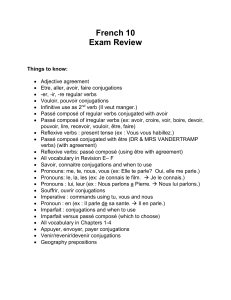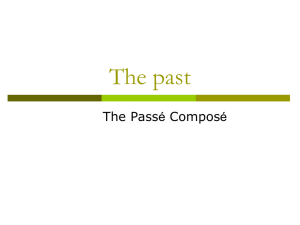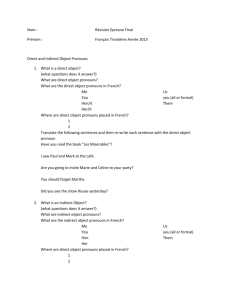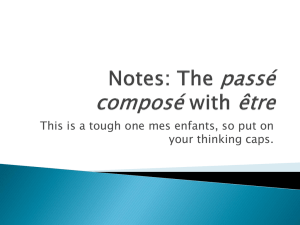The passé composé is a compound conjugation, which means it has
advertisement
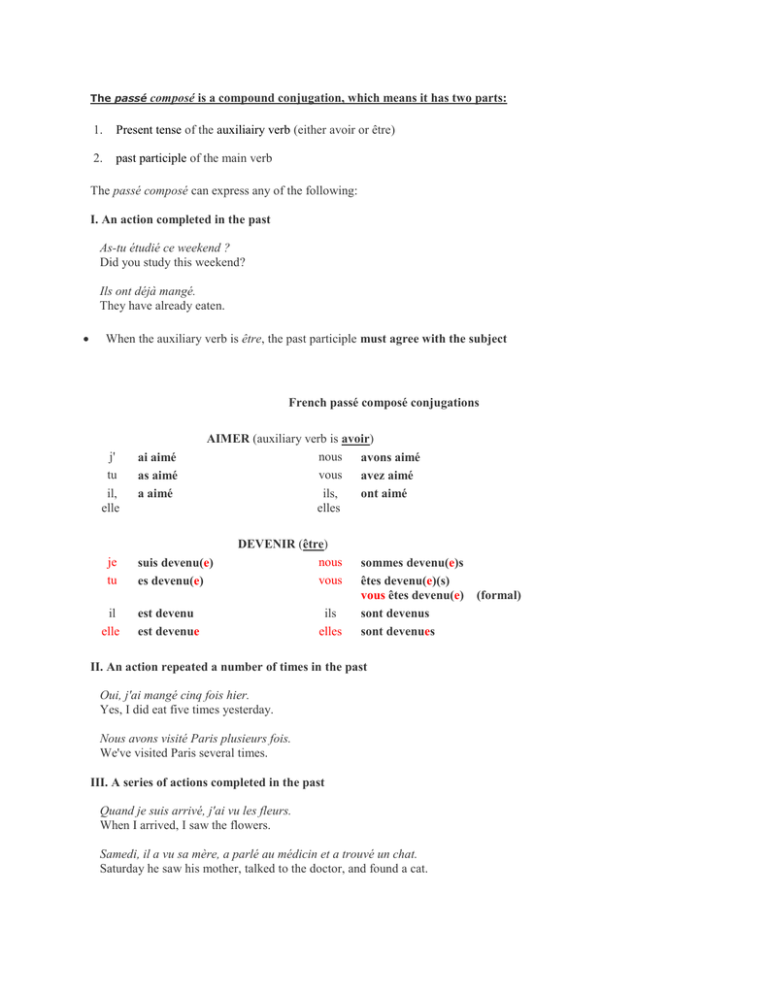
The passé composé is a compound conjugation, which means it has two parts: 1. Present tense of the auxiliairy verb (either avoir or être) 2. past participle of the main verb The passé composé can express any of the following: I. An action completed in the past As-tu étudié ce weekend ? Did you study this weekend? Ils ont déjà mangé. They have already eaten. When the auxiliary verb is être, the past participle must agree with the subject French passé composé conjugations j' tu il, elle je tu il elle ai aimé as aimé a aimé AIMER (auxiliary verb is avoir) nous avons aimé vous avez aimé ils, ont aimé elles suis devenu(e) es devenu(e) DEVENIR (être) nous vous est devenu est devenue ils elles sommes devenu(e)s êtes devenu(e)(s) vous êtes devenu(e) sont devenus sont devenues II. An action repeated a number of times in the past Oui, j'ai mangé cinq fois hier. Yes, I did eat five times yesterday. Nous avons visité Paris plusieurs fois. We've visited Paris several times. III. A series of actions completed in the past Quand je suis arrivé, j'ai vu les fleurs. When I arrived, I saw the flowers. Samedi, il a vu sa mère, a parlé au médicin et a trouvé un chat. Saturday he saw his mother, talked to the doctor, and found a cat. (formal) The passé composé has three possible English equivalents. For example, j'ai dansé can mean 1. 2. 3. I danced (simple past) I have danced (present perfect) I did dance (past emphatic) The Story* of Dr. & Mrs. P. Vandertramp This story is of Dr. & Mrs. P. Vandertramp, a couple which lived in the house of être. Their house was in Paris close to the Seine river. Everybody knew that for the best doctor care, they would call on Dr. Vandertramp. One day, Dr. Vandertramp was tending to a sick little student who was suffering with a terrible headache. The headache was caused because he did not know the verbs that use être in the past tense. Just as luck would have it, Mrs. Vandertramp came home and noticed the sick student. Mrs. Vandertramp spent some time during the American Civil War helping soldiers learn the French language. "Maybe "How my can wife I can help help you," you," asked said Dr. Mrs. Vandertramp. "She Vandertramp, "What taught is French causing for this many years." headache?" "I don't know the verbs that take être in the past tense," cried the student, "I have a test tomorrow over the words! If I fail the test, my parents will severely punish me." So Mrs. Vandertramp agreed to help the student with his problem. She showed the student a mnemonic device that he could use for the test. The device was based on the doctor's name. D escendre R ester & M onter R evenir S ortir P asser V enir A ller N aitre D evenir E ntrer R etourner T omber R entrer A rriver M ourrir P Artir After the student saw the device, his headache amazingly disappeared! "I think I can do it," cried the student, as he rushed home to study the device. The student returned a week later to let the couple know that he received an A on the test, and that his parents were so proud of him! His parents had recently moved to France from America, and they wanted their son to succeed. To show their gratitude, the parents baked the Vandertramps a beautiful American apple pie! And the rest, as they say, is history... * This story is pure fiction. Any names used living or dead is purely coincidental. Passé composé 1. Nous aimons 2. Il parle 3. Tu finis 4. J'apprends 5. Elles ont 6. Vous êtes 7. Tu veux 8. Nous choisissons 9. Elle sait 10. Je crois 11. Ils prennent 12. Vous étudiez 13. Elle pense 14. Nous lisons 15. Je dis 16. Tu réponds 17. Elles abolissent 18. Vous mettez 19. On ouvre 20. Je connais
